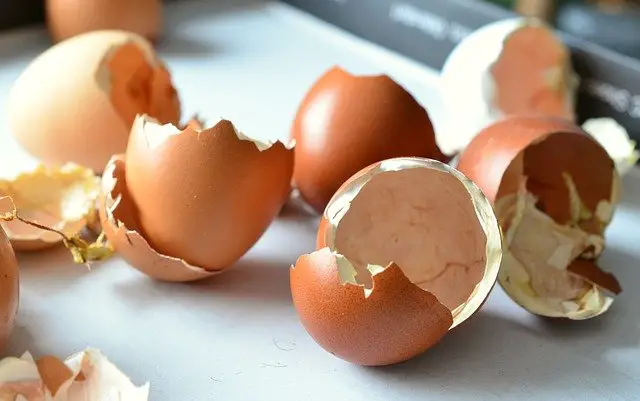If you’re asking this question, there’s a high chance you’ve installed, or you’re planning on installing a garbage disposal system, and you’re very much afraid of damaging it (after all, $400 is no joke).
Lucky for you, you’re going to find the answer to that, alongside other questions you might have. But first, to answer your question:
It’s not advisable to throw egg shells into the garbage disposal: You might have probably watched a DIY video that gave you the wrong idea that egg shells could help sharpen the blades of your garbage disposal, but that couldn’t be further from the truth.
You see, garbage disposal systems don’t even have blades to be sharpened in the first place, they have impellers which are not very sharp, so if you throw egg shells in them, the membrane (that white thin layer around a hard boiled egg) could wrap around the impellers and damage your system. As a matter of fact, egg shells are very much not recommended for garbage disposals.
What Can You Do with Egg Shells Instead?
There are so many ways you can reuse egg shells rather than just tossing them into the trash. You could always:
Turn them into scouring powder
You can do this by leaving the egg shells out in the sun to dry, after which you take them inside, crush them to powder using a blender, or mortar and pestle. Once it’s fine and smooth, add baking powder to the mix, and voila! Your scouring powder is ready to be used on pots and pans that need them.
Use eggs shells to keep cats at bay from your garden
Tired of cats always pooping around in the garden? Spread egg shell powder over the places where they usually litter. The roughness and coarse nature of the powder will make their delicate paws very uncomfortable, and this will stop them from coming back.
Give your birds some calcium
Egg shells are super rich in calcium. It’ll serve as a good source of it for your pet birds. Be sure to consult professional veterinary advice before opting to add it as a food in your pet’s menu!
It’s not only the birds, it’s good for you too
Do you know that it’s perfectly safe for you to consume egg shells? All you need to do is bake them, and then crush them into fine powder, after which you can spread it on your food to boost your calcium levels.
You could sharpen your knife with it
You’re not going to crush the shells for this one, all you need to do is put the shells in the freezer, and when they’re frozen solid, you can bring them out and run your knife across them.
Apart from egg shells, what else shouldn’t I put into the garbage disposal?
- Spaghetti (Pasta) and other starch foods
With pasta being a staple food in the United States, it’s no doubt that a lot gets thrown away. However, I’ll advise you to toss it into the trash instead of the garbage disposal.
This is because foods like pasta and rice expands when exposed to water; this could end up clogging the whole system.
- Shells and Bones:
Shells (seafood shells) usually emit an awful smell when left in the trash, and as a result, people would either throw them outside or try and get rid of them through the garbage disposal.
You should know that when the shell gets broken by the system, there’s usually a lot of debris hanging around which won’t easily come off (same with bones). These accumulate with time until the impellers become overwhelmed. And you know what that spells out? A broken system!
- Strong Drain Cleaners
Please, be very careful of the type of cleaning chemicals you pour into your garbage disposal. Simple cleaners such as the “Green Gobbler Refresh Drain & Disposal Deodorizer” work wonders for garbage disposal, but heavy duty chemical drain openers may corrode the drain line and damage it.
The best type of chemicals to use are those specially formulated for cleaning drain and disposal, like the one mentioned above. Additionally, please do not use oil (see why below) and latex paint too because it clings to drain pipes and hardens.
- Oil
Oil usually thickens with time, most especially when the temperature is cold. You might have a good time at first, sliding those oily foods down the system, but with time, they’ll set, harden and block everywhere — clogging.
Unfortunately, getting a plumber to unclog the garbage disposal as a result of grease clog is quite expensive because that is one of the most difficult clogs to handle.
Leftover fried eggs, bacon, chicken, and gravy should go into the fridge or the trash, but never squeezed into the drain to end up in the disposal.
- Potato or yam peels:
The outer skin of potato will become starchy in a cold environment with time. This would cause it to become sticky and cling to the pipes of the entire system.
What are some precautions to take when you’re handling a garbage disposal system?
If you think you can just get up, scrape the content of your plate into the garbage disposal and flip the switch, you’re the kind of persons putting plumbers in business.
Here are the do’s and don’t of operating a garbage disposal system, and some may even shock you.
- Do not use the garbage disposal as a literal garbage disposal: In fact, to be on the safe side, ensure that apart from mild chemicals, anything that isn’t leftover food shouldn’t be tossed into the system— no shells, stones, bones, sand, none of that. Those things won’t clean it or act as scouring, they’ll only end up costing you a lot on repairs.
- Don’t overload it: It’s advisable to scrape a little into the system at a time, no matter how powerful you think your system is, you’d be surprised when you feed your machine with leftovers one day and it starts humming loudly without doing anything (sign of a clog)
- Don’t add anything stringy: Garbage disposals aren’t made up of blades (like I said earlier), so if you put stringy stuff like thread, as well as leftovers highly rich in fiber, the impellers would end up wrapping them around itself until it becomes too heavy to move
- Run the system with hot water: When you pour hot water into the system as it goes, the heat would help to melt any fatty or oily substance that had solidified a while ago, thus making it to flow around freely.
- Do not attempt to sharpen it: This could increase your chances of adding something that would break the system. Garbage disposals, like I’ve been saying, don’t have blades, they don’t need any form of sharpening.
- Don’t neglect water: It’s very much advisable to pour in water before you run the system, while you’re running the system, and after you’ve run the system. I know I’ve said something similar to this but I just wanted to stress how important water is.
How do you clean the garbage disposal
Garbage disposals, like any other house hold appliance can get very dirty, and when they do, the smell is seriously awful.
However, before you open the bottle of chemicals, there are some simple household practices you can try first
- Cut the power to the system: This may seem obvious but you’ll be surprised how many people forget.
- Clean the splash guard: The splash guard has a lot of crevices and groves which could make it a bit problematic to get it cleaned up, that’s why it’s advisable to use a toothbrush and lots of dish detergent.
- Remove as much food debris as you can: This will make cleaning a whole lot easier when you run the system.
- Run the system with some ice cubes and liquid soap: The ice cubes will help to knock off the grime. You could also use vinegar and baking soda to not only create foam, but add some level of freshness to the mix.
How can I tell if my garbage disposal is clogged?
Like I said earlier, if it’s humming and vibrating without actually doing anything, it’s most likely clogged. If you notice something like that, turn off the system quickly because if you allow it to keep running, the motor will definitely overheat and burn out.
You could also tell if the whole thing is jammed by the smell:
When the garage disposal system can’t take care of leftovers, they’ll settle inside the machine, start to decompose, and release a very foul and strong smell. Also, if you pour water into the system and it “vomits” it back up, it’s a sure sign that the whole thing is jammed.
What steps do you take if your system is clogged?
- Cut off power to the system: I’ll advice you to still be careful, even though the power is out because the switch could be faulty
- Once you’ve located what clogged your machine, reach into it with a pair of pliers and try to grab it. You could also use a wooden spoon but never use your hand.
- Push the wooden spoon against the impeller and rock it back and forth to free it.
- Wait for the machine to cool off (preferably a 15 minute wait), after which you hit the reset button located on top of the machine.
If none of these work, don’t make it worse, call a professional.
Frequently Asked Questions
What can I put in the garbage disposal?
When it comes to the garbage disposal, the rule of thumb is; if you can feed it to your baby, you can put it in the garbage disposal. This includes soft food, not too oily substances, fruits, and vegetables.
Can you put coffee grounds into the garbage disposal?
No! You shouldn’t put coffee grounds into the garbage disposal. Not only would the garbage disposal not be able to crush it properly, the debris would leave your kitchen smelling like coffee.
How long do garbage disposals last?
Most garbage disposal would last up to 10 years, but of course this would depend on how heavy the usage is and also the quality in the first place – another way of saying the brand.
Conclusion
You shouldn’t put egg shells into a garbage disposal for any reason because, from all indications, your garbage disposal system is much more fragile than you think.

